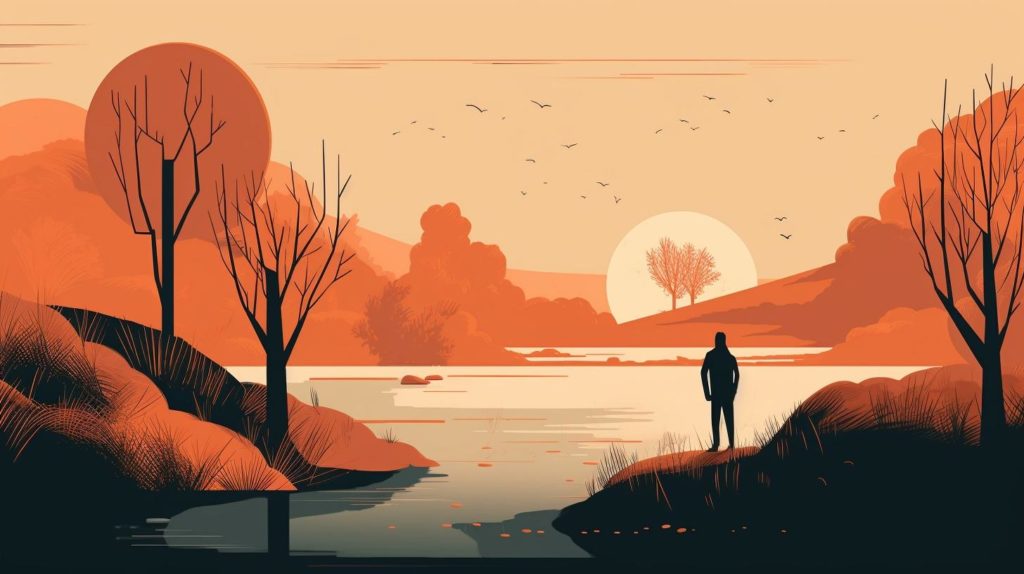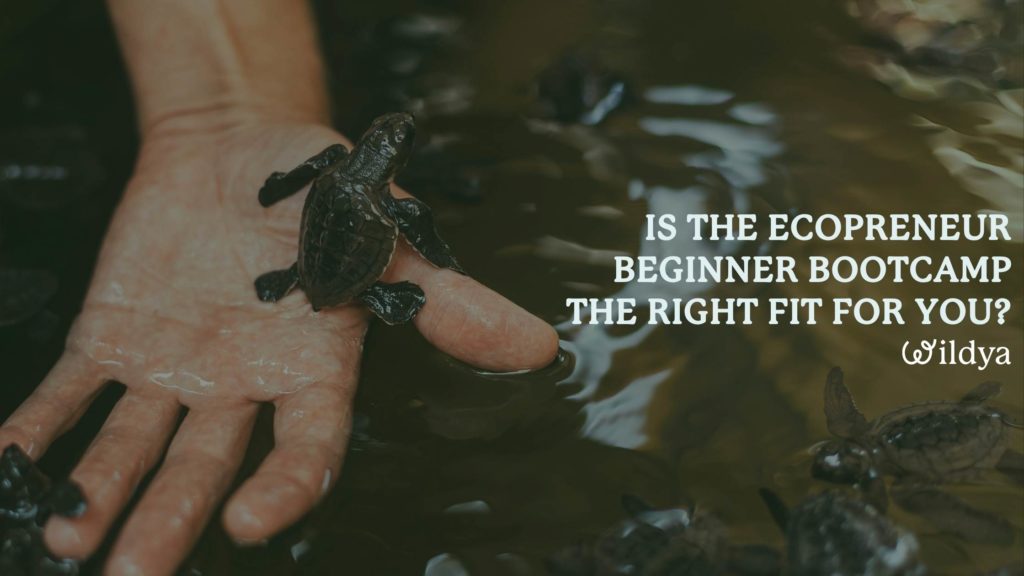You may hear the word ‘learning’ and immediately think of teachers and textbooks, yet nature-based learning is far beyond piles of paper and exhaustive classrooms. Learning from nature promotes not only your personal growth, but supports your professional development too.
📸 Picture this: outdoor wilderness exploration, field trips supporting nature discovery, and conservation projects encouraging environmental education.
Sounds awesome, right? Nature-based learning takes education from the four walls of a traditional classroom and into the great outdoors. However, discovering what fauna and flora can teach us is more than just a simple change of scenery, it’s packed with a bundle of benefits.
Many believe that going into the wild to learn about plants, animals, ecosystems, and so on is an activity that only benefits children.
Spoiler alert: it’s important to recognise that this approach can also benefit our adult, personal, and professional lives too. By outlining the advantages below, we aspire to illustrate the impact that nature-based learning can have in both your personal and professional environments.
What is nature-based learning?
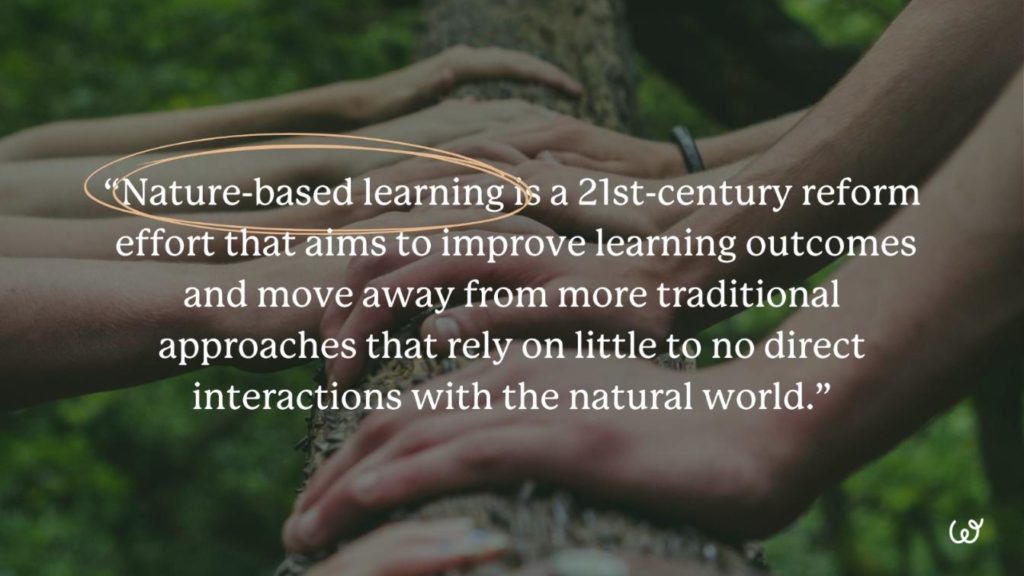
Let’s start with the basics. Nature-based learning is a 21st-century reform effort that aims to improve learning outcomes and move away from more traditional approaches that rely on little to no direct interactions with the natural world 1. Learning in nature fosters direct engagement with the environment, inspiring you to explore, observe, experiment, and learn from authentic outdoor experiences.
Essentially, nature-based learning is an educational approach that takes advantage of the natural world as a dynamic and interactive learning environment. So, how can you integrate this learning approach into both your personal and professional settings?
Types of nature-based learning we experience
Although originally viewed as a concept born from methods of child development, the joy of learning from nature has no limits – it’s an adventure for everyone, regardless of age.
In an earlier study 2, three unique types of nature experiences were identified:
- Direct: Involves experiences within a natural setting. This can include a woodland hike, wild camping in a forest, or collecting shells on a beach walk.
- Indirect: Involves learning experiences in a nature-structured context. Think of visiting an arboretum or your local garden center to observe and engage with nature!
- Symbolic: Involves experiences with representations of nature. This can range from reading about a new species to studying pictures of plants.
Wildya uses symbolic nature-based learning to transform your eco-anxiety. We believe it is important to learn from and about other species. In our app, your tutor is not ‘David’ or ‘Lisa’, instead, you are taught by nature itself. Each week varies; it can be an elephant, ostrich, or dung beetle – you name it, we have it!
What makes nature-based learning a wise choice for companies?
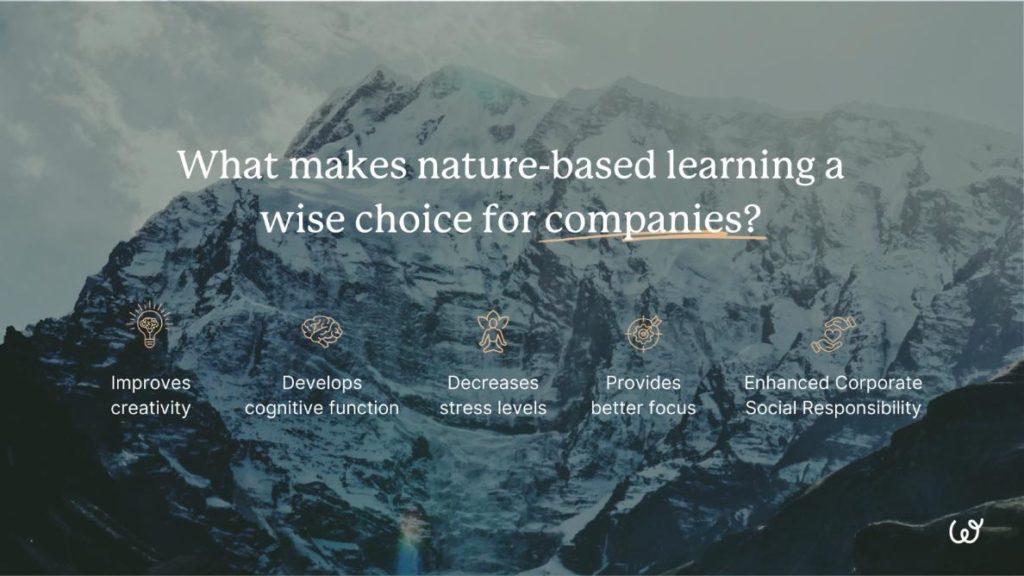
- Improves creativity
Adding nature-based learning to training programs and team-building activities will inspire a wealth of new perspectives. It sparks creativity amongst employees and fosters a vibrant workplace!
- Develops cognitive functions
Studies show that being surrounded by nature can spark creativity like nothing else, making it an ideal setting for brainstorming sessions and walking-talking meetings.
- Decreases stress levels
Nearly 50% of UK adults said being close to nature helps reduce stress 3. Spending time in nature can result in higher morale, increased job satisfaction, and lower rates of burnout. It’s a win-win!
- Provides better focus
Time spent outdoors can rejuvenate the mind, allowing employees to return to their tasks feeling recharged and refocused.
- Enhanced Corporate Social Responsibility (CSR)
Embracing nature-based learning initiatives shows a dedication to social value and environmental stewardship, highlighting a genuine commitment to making a positive impact!
How does learning from nature improve personal growth?
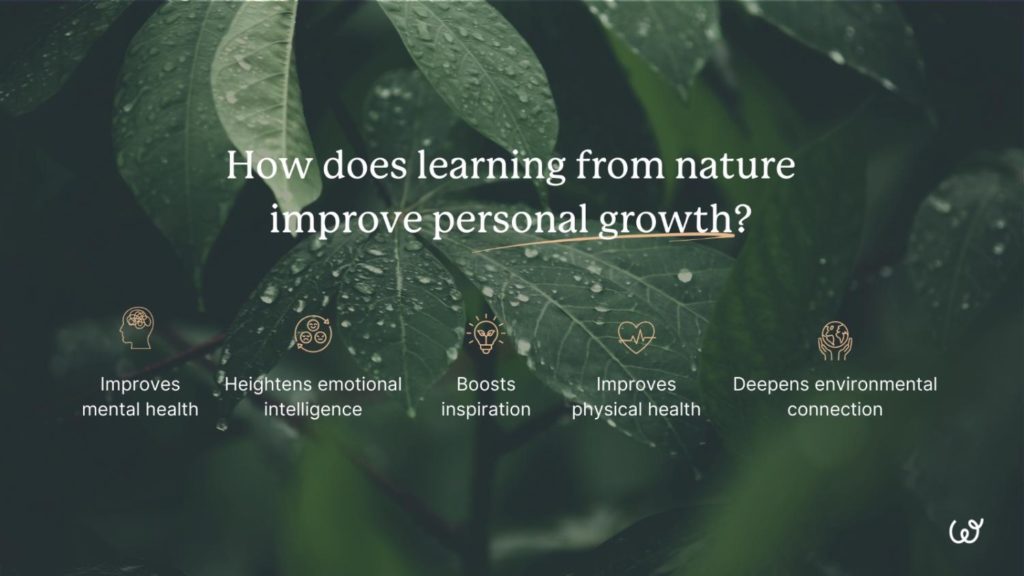
- Improves mental health
Escape the hustle and bustle of daily life and immerse yourself in the calming embrace of nature. It’s like hitting the reset button on your mind and spirit!
- Heightens emotional intelligence
Nature-based experiences cultivate empathy and self-awareness, allowing you to connect with your surroundings and understand your relationship with the natural world.
- Boosts inspiration
Breathe in the fresh air, soak up the sunshine, and find gratitude in nature’s simple pleasures. With every bird song and flower bloom, feel inspired by your ever-growing environment.
- Improves physical health
Lace-up your hiking boots or grab your yoga mat – nature-based activities offer a fun way to stay active, boost your physical fitness, and improve your immune system. Doing what you love and being rewarded by nature for it – learning from nature never sounded so easy!
- Deepens environmental connection
Individuals who engage in nature-based learning are more likely to develop a sense of responsibility for protecting the natural world. Every tree you hug and trail you tread will bring you closer to the planet!
How can you incorporate nature-based learning into your daily routine?
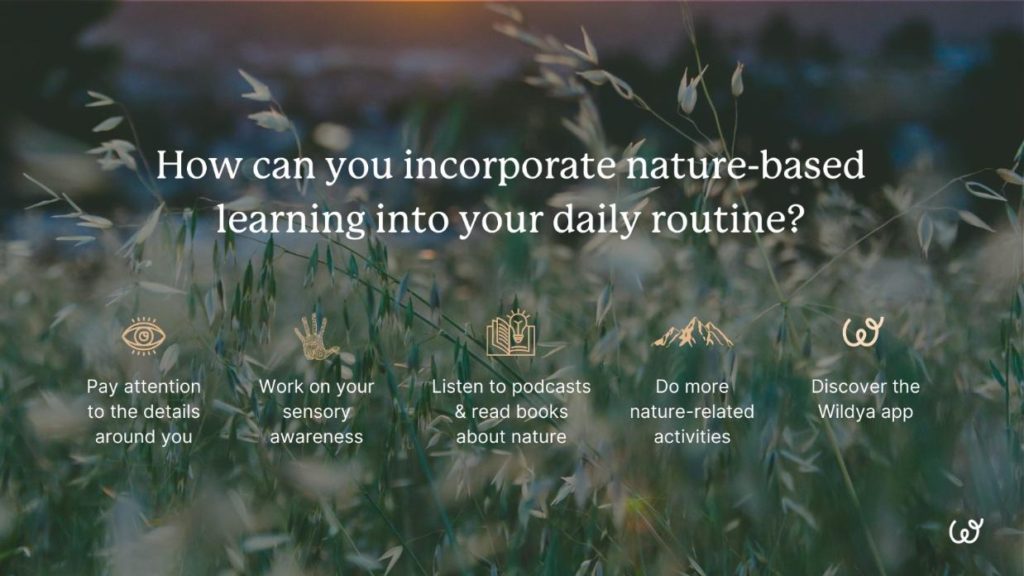
Pay attention to the details around you
Ever noticed how fascinating nature can be, even in the smallest details? There’s always something to admire, whether it’s noticing the intricate patterns of a fallen leaf or listening to the chirping birds whilst enjoying your morning coffee. Making shapes out of clouds or noticing how the sunlight dances on a lake counts, too!
Work on your sensory awareness
Nature excels at captivating all of our senses, from sight and sound to touch, smell, and even taste. Improving your sensory awareness involves actively engaging with your surroundings and tuning into each of these senses. You may approach this as a challenge at first, but it’s often something we do subconsciously. Here are our wildest tips to improve your sensory awareness:
- Take time to truly observe the colors, shapes, and movements around you.
- Practice deep breathing exercises to heighten your awareness of scents in the air.
- Let your fingers explore a variety of natural surfaces and notice the different textures.
- Close your eyes, identify the noises surrounding you, and try to discern their sources.
- Pay attention to the flavors and textures of your food – notice the subtle differences in taste and how they evolve.
- Keep a sensory journal that records your observations using each of your senses.
Listen to podcasts and read books about nature
Enriching both your knowledge and well-being is one of the many benefits that you accumulate by listening to podcasts and reading books about nature. This form of nature-based learning not only deepens your understanding of the natural world but also offers insights into ecosystems, wildlife, and environmental issues, nurturing a profound appreciation for nature’s true beauty.
Nature is still confined to a niche, making it a challenge to find great podcasts that delve into nature and the practice of rewilding it. Here’s the exciting part – we’ve handpicked the best nature podcasts and curated a Spotify playlist specifically for you! Join our Wild Ears community by tuning into our podcast playlist as a way to learn from nature.
Why not challenge yourself to 15 minutes per day learning about nature through podcasts and/or reading? Action starts with awareness!
Sign up for a nature-based learning program
Seamlessly integrate nature-based learning into your routine by being involved in one or more nature-based learning programmes. They provide valuable opportunities for learners to develop skills, knowledge, and attitudes that are essential for thriving in today’s world.
‘But Wildya, what exactly is a nature-based learning programme?’
They often offer a variety of activities like guided nature walks or outdoor workshops that give you the opportunity to foster connections with like-minded individuals and not just nature. Our eco-allies community is a great example of a global movement that welcomes individuals who struggle with eco-anxiety to rejoice in support, learn more about the climate, and cultivate nature action together.
Do more nature-related activities
Adding nature-based learning to your daily routine is super easy and fun! Think about it – you can start by taking a walk around your local park, observing the flowers, animals, and wildlife you encounter along the way. Gardening is another fantastic way to connect with nature, whether you have a small balcony garden or a larger plot of land – it’s not one size fits all. Even something as simple as eating meals outside or reading a book under a tree can provide valuable moments of connection with the natural world.
Is it time to start a new hobby? Hiking, wild-water swimming, tree climbing, and diving are some of our favourite past-times! Infusing your daily life with nature-based activities will stimulate a deeper appreciation for the environment and inspire curiosity in yourself and those around you.
Discover the Wildya app
Let’s address the elephant in the room. Catalysing climate-anxiety into action is HARD. It’s a good job our expertise lies within helping you protect/restore nature whilst nurturing your own mental fitness.
We believe that nature and personal development go together like veggie burgers & fries. Yum!
Nature has the most successful Research & Development (R&D) department in the world. Things have been smoothly running for millions of years now. So why not try to learn from it?
For centuries, nature has become our inspiration for innovation. Less painful needles, wind turbines, or the ability to fly are all innovations that were hugely influenced by nature. Nature can also help us in the current mental health crisis.
And so, this is how the Wildya app was born. Instead of theory, we focus on action – become a part of the movement today by transforming your eco-anxiety into action by learning from nature.
Isn’t learning from nature just amazing? It’s an awesome educational approach that goes way beyond a regular classroom and utlises the natural world as our learning playground. As nature lovers, we may be biased, but learning in nature really packs with tangible benefits that you can’t ignore! By diving into the great outdoors, you are opening doors to endless possibilities for growth, learning, AND adventure.
If you’ve never considered the wonders of nature as a classroom – now is the time to start!
Ready to develop yourself whilst making a difference for the planet? Download the Wildya app to tackle your eco-anxiety and protect 1m2 of nature each month, all through nature-based learning.
Sources:
1 Nature-Based Learning, Bababop;
2 Nature: How connecting with nature benefits our mental health; Mental Health Foundation;
3 Our Proud Heritage. Take It Outside: A History of Nature-Based Education, NAEYC.

